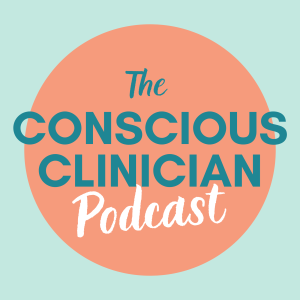
Sunday Mar 14, 2021
Episode 9: Vicarious Trauma in Healthcare with Dr. Brie Robertori, PsyD
Episode Summary
Our special guest in this episode is Dr. Brie Robertori, PsyD, a clinical psychologist who specializes in family therapy, trauma-informed care, and multicultural practice. After experiencing vicarious traumatization through her training, she developed a passion for trauma-informed practice. This passion led her to complete her dissertation as a program evaluation for a trauma recovery clinic, with a goal of ensuring that clients were receiving trauma-informed care and that treating clinicians were receiving support for vicarious trauma exposure.
Brie shares best practices when screening for abuse and trauma, including how we can respond with compassion and strength when someone says yes. On the flip side, trauma exposure carries a risk for healthcare providers.
“The definition of vicarious trauma is that we're impacted by our clients or our patients and the things that they've gone through, the pain that they've gone through because we care. It's because we care that we get vicariously traumatized. Not because we're not good enough.” She shares how we can create space for ourselves to process our natural responses.
We also explore how healthcare systems propagate trauma and what changes would support providers instead. She goes on to say that “We need to pull on every single way that we can articulate and metabolize these experiences and not just alone but in the company of others, which is sharing this with our supervisors and directors and making sure that we have advocates internally because we can't just expect to do this alone. In fact, expecting that it's just something we need to take care of alone is a further perpetuation of this kind of trauma-organized system.”
Ultimately, the most courageous thing we can do as providers is care for ourselves, because that will change the system.
--
Dr. Robertori has worked with children, families, and adults across the life span who have been impacted by psychological trauma related to domestic violence, child abuse, sexual abuse/assault, community violence, racial marginalization, and immigration ruptures. She is collecting hours for licensure as a Bilingual Family Clinician (Spanish-English) at Through the Looking Glass, a non-profit that serves Medi-Cal clients with intellectual, developmental, or health-related disabilities. Her therapeutic style is systems-focused, strengths-based, intimate, and warm. Dr. Robertori completed her B.A. at the University of CA, Berkeley and her Doctorate in Psychology at the Wright Institute in Berkeley.
Highlights from our conversation with Dr. Brie Robertori, PsyD
- Brie’s intro and how she got into psychology (0:33)
- Screening for trauma/abuse history (5:06)
- The power in owning your trauma (11:16)
- Supporting our patients and using our power wisely (14:16)
- Screening for the different types of trauma (18:32)
- Vicarious trauma experiences (24:47)
- A call for systemic change (36:09)
- The definition of vicarious trauma and changing out expectations (41:45)
- Redefining what it means to be a “strong” clinician (46:43)
- Burnout, vicarious trauma, and moral injury (49:27)
- Brie’s Lightning Round (62:43)
Thank you for listening to The Conscious Clinician. If you enjoyed this episode, please subscribe and write a review for the podcast to grow our community. Keep the conversation going by following The Conscious Clinician on Instagram and Facebook.
Comments (0)
To leave or reply to comments, please download free Podbean or
No Comments
To leave or reply to comments,
please download free Podbean App.